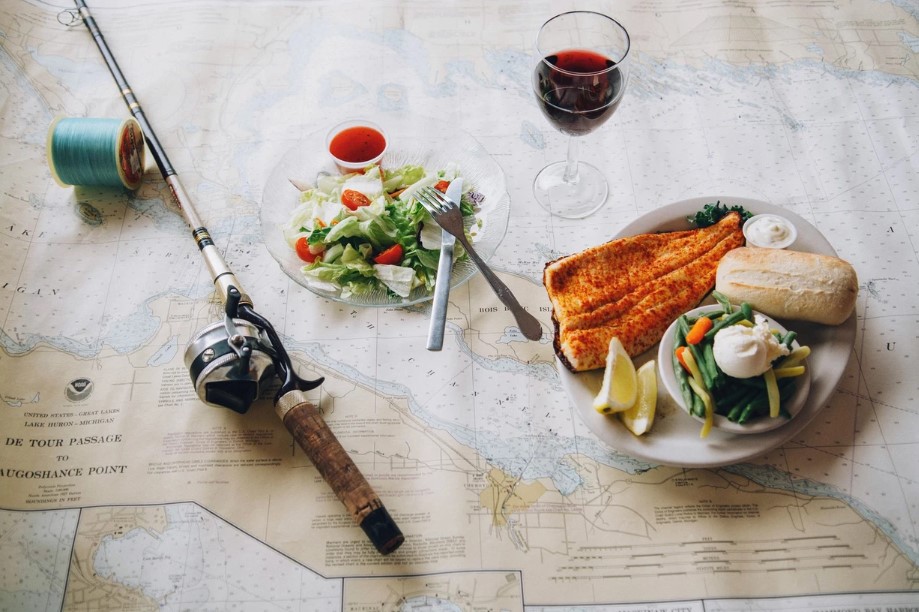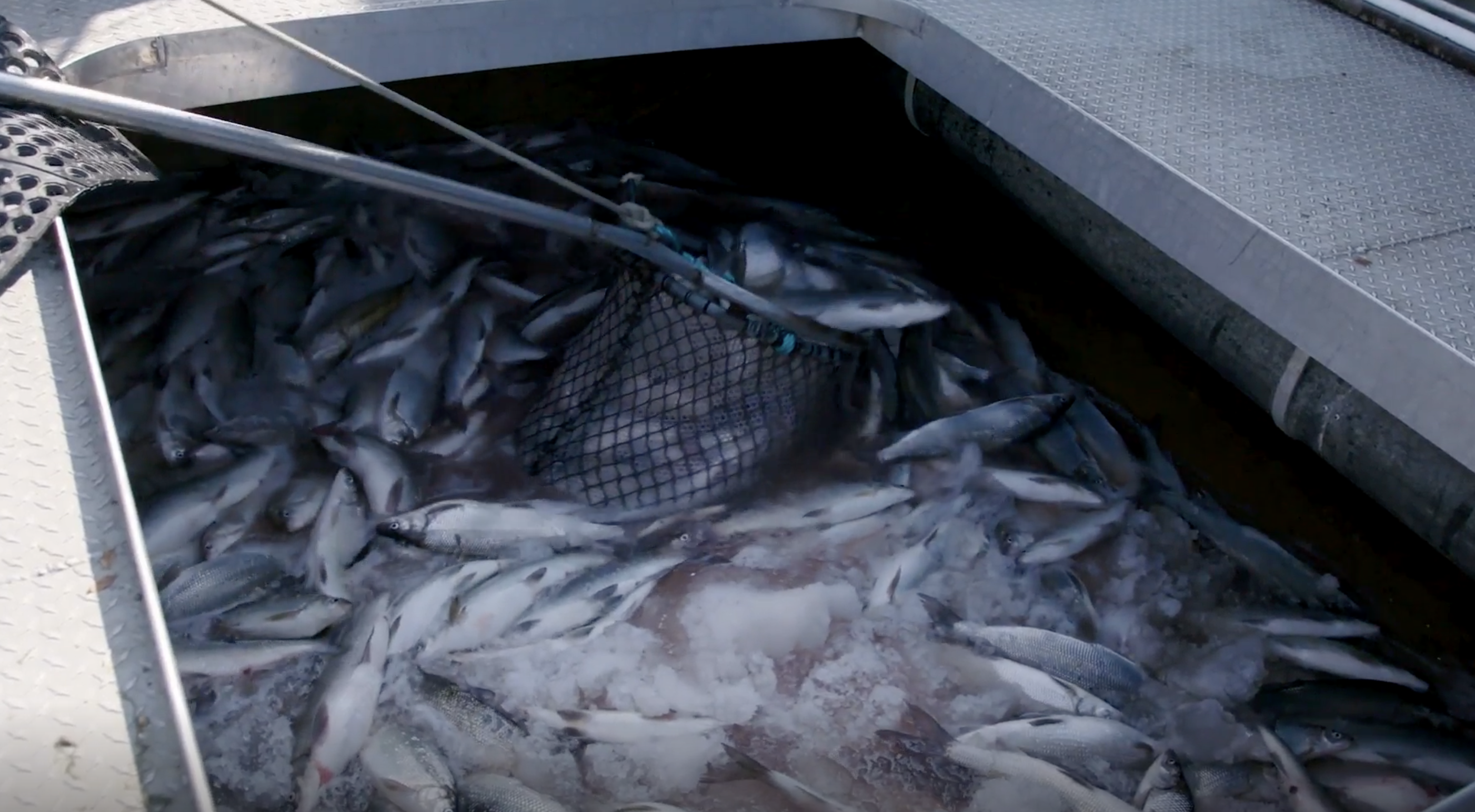
- Details
- By Neely Bardwell
Whitefish, a pale, silvery and green-brown freshwater fish is Native to the Great Lakes Basin and a staple in the community, food, and culture of Native tribes surrounding the Great Lakes. The Anishinaabe people have held the whitefish in high regard since creation.
“Whitefish is one of the species that is a part of our creation story,” explained Doug Craven, Natural Resources Director for Little Traverse Bay Bands of Odawa. “The animals were feeling pity for the Anishinaabe people who were having a hard time finding food to eat, so there was a gathering of the animals and fish. There was a circle. Each one went around and was asked who would help the Anishinaabe, what they could do to help the Anishinaabe through this time of need. Whitefish was one of the species that raised its hand and said that it would have pity on Anishinaabe and provide itself as a food source.”
[Editor's Note: This article is co-publihsed with Great Lakes Now - Powered by Detroit PBS.]
In the upper peninsula, the “U.P.” of Michigan, stands a Native owned and run restaurant that views the Soo Locks, and whose specialty is Whitefish.
Goetz’s Lockview Restaurant in Sault Ste. Marie has sold whitefish as the primary menu item since it opened in 1945. On the restaurant’s website, they recount the story of how the whitefish was sourced when they first opened:“The former owner and his dishwasher would walk over to the Locks after breakfast to catch the fish to serve for lunch that day.”
Now, Lockview doesn’t source their fish from the Locks, but instead rely on local commercial fishermen from the community for their whitefish. The restaurant’s main whitefish sourcer is a citizen of the Sault Ste. Marie Tribe of Chippewa Indians, the same tribe as the restaurant’s owners, the Goetz family.
Being able to serve whitefish is truly a community effort, one that’s tragically being threatened by the declining whitefish populations in the Great Lakes. Some experts fear the total collapse of the species in just a few years.
The Little Traverse Bay Bands of Odawa (LTBB) Natural Resources Department is taking steps to ensure the future of whitefish in the Great Lakes Basin is a bright one.
“One of the issues facing whitefish is this thing called Mismatch Theory, food availability versus when they hatch. When the climate was more stable it was pretty predictable when the hatch was going to happen and when the plankton blooms were going to happen. The fish eat plankton,” explained LTBB’s Great Lakes Fisheries Program Manager Gary Michaud.
In order to study whitefish and fish in general, there are multiple steps that need to be done in order to fully understand the problem. In the spring while the fish are starting to hatch, the tribe will go out to four current indexing locations across Northern Michigan to catch, study, and release. This continues through the spring and into the fall.
“As fall comes around, we’ll use hydroacoustic work, basically sonar, and look for the fish and the bass,” Michaud said. “So instead of setting nets all over the Little Traverse Bay, we just run passes through the bay at night to see sizes of fish in the area and we approximate how many there are out there.”

On top of collecting population data, the tribe also collects whitefish eggs from the bay where they will eventually live at the hatchery. The whitefish are raised at the hatchery until they get to about 60 millimeters in size which will give them the best shot at survival after being released into the Bay. These efforts are all to ensure that Whitefish populations become stable and plentiful in order to continue to support fishermen, community, and culture.
“Commercial fishermen, subsistence fishermen are a part of the Odawa identity. It’s important that we have a fishable species out there. Whitefish, lake trout, have been predominantly the species that we’ve harvested the most in,” said Doug Craven, LTBB Natural Resource Department Director, in an interview. “If whitefish is to become extirpated from the Great Lakes, it would jeopardize our commercial fishermen, and our community”
William Ortiz, LTBB citizen and tribal council member, started “small boat” commercial fishing in 2015. Before he was a tribal council member, his primary source of income for his family was fishing. Ortiz was the first gillnet fisherman on Big Bay De Noc since 1985 after receiving a special permit in 2017.
“After I got that special permit, I was allowed 3000 feet of large mesh gill net. I still had a small boat at the time, so my wife and I set the nets, and the next morning, I came back to the nets at six o’clock in the morning. I started lifting the nets and it was just whitefish after whitefish. It was packed,” explained Ortiz. “I’m lifting nets, and I’m running out of places to put them. One of the other fishermen was coming by, so I called him up, and he dropped some boxes off to me. I filled those all up, and I still had 1000 feet of net to lift back in, so I ended up calling the fish company to meet me at the dock, which they’ve never done before because I still had more nets to empty. That day, I caught over 3000 pounds of fish.”
In the years following that amazing whitefish catch, Ortiz explains that each year, the amount of fish available in the bay continued to drop. In 2020, Ortiz used what fish he caught to give to his tribal community during the pandemic. Fishing gave Ortiz the opportunity to connect more with his community and has used it as a way to give back.
“I’ve had the opportunity to go out to the community and teach people how to build nets,”said Ortiz. “We’ve started workshops on how to go out and subsistence fish, and how to care for your fish and things like that. Learning how to do it myself has given me an opportunity to teach other people, people in my tribe.”
Ortiz emphasized that fishing is often an intergenerational thing, with one boat having multiple generations of a family inside. It is fishermen like Ortiz that keep whitefish on the menu for restaurants like Lockview.
Mitch Goetz, Sault Ste. Marie Tribe citizen, explains that whitefish is by far their most popular item, far outselling anything else on the menu. Goetz is the son of the owners and the current manager at the restaurant.
“Our town is small, but we do have regulars, especially during the beginning, when we open, there’s nothing going on,” said Goetz. “We rely on these people. There’s people that can’t wait, all winter they’re asking when we’re going to open up. There’s people that come in every Friday or whatever day, and they expect whitefish.”
Catch more news at Great Lakes Now:
Great Lakes Moment: Detroit River’s important role in lake whitefish
Whitefish are on brink in Michigan. Can they learn to love rivers to survive?
More Stories Like This
NCAI Passes Two Emergency Resolutions on Immigration Enforcement ActivitiesChickasaw Lighthorse Police Officer named Indian Country Law Enforcement Officer of the Year
Indian Gaming Association Rallies Broad Coalition Against Sports Event Contracts It Calls Illegal Threat to Tribal Sovereignty
Navajo Resources and Development Committee Issues Notice on Livestock Inspection Requirements
American Prairie, Tribal Coalition Files Protest Over Rescinded Grazing Rights
Help us defend tribal sovereignty.
At Native News Online, our mission is rooted in telling the stories that strengthen sovereignty and uplift Indigenous voices — not just at year’s end, but every single day.
Because of your generosity last year, we were able to keep our reporters on the ground in tribal communities, at national gatherings and in the halls of Congress — covering the issues that matter most to Indian Country: sovereignty, culture, education, health and economic opportunity.
That support sustained us through a tough year in 2025. Now, as we look to the year ahead, we need your help right now to ensure warrior journalism remains strong — reporting that defends tribal sovereignty, amplifies Native truth, and holds power accountable.
 The stakes couldn't be higher. Your support keeps Native voices heard, Native stories told and Native sovereignty defended.
The stakes couldn't be higher. Your support keeps Native voices heard, Native stories told and Native sovereignty defended.
Stand with Warrior Journalism today.
Levi Rickert (Potawatomi), Editor & Publisher


